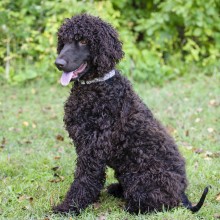Irish Water Spaniel
Lifestyle Needs
 The Irish Water Spaniel is said to be a breed of great antiquity. As his name suggests, he loves water and is an enthusiastic retriever. He is the tallest of all the Spaniels and gets his intelligence from the part that Poodles played in his ancestry. The IWS is a dark liver colour with a coat of dense, tight ringlets. He is said to be an affectionate and lovable dog with a sense of humour! The IWS will need to live in a house with a large garden and needs two hours exercise every day – a good portion of which will need to be off lead.
The Irish Water Spaniel is said to be a breed of great antiquity. As his name suggests, he loves water and is an enthusiastic retriever. He is the tallest of all the Spaniels and gets his intelligence from the part that Poodles played in his ancestry. The IWS is a dark liver colour with a coat of dense, tight ringlets. He is said to be an affectionate and lovable dog with a sense of humour! The IWS will need to live in a house with a large garden and needs two hours exercise every day – a good portion of which will need to be off lead.
Genetic Diversity
(Known as Coefficient of Inbreeding: 'COI'. It should be as low as possible.)
The UK Kennel Club breed average COI is 3.5% - See 'A Beginners Guide to COI'
Gene Pool Size
(Known as Effective Population Size: 'EPS')
TBC
EPS is a measure of how many individuals are contributing genetically to a breed population. It is a measure of the size of the gene pool in a breed. Lower than 100 is considered critical by conservationists and below 50 brings a breed close to extinction. For more information see the Kennel Club article.
Health and Welfare Problems due to Conformation
(Body shape and physical characteristics)
- Gastric Dilatation Volvulus (GDV) (Bloat/Torsion)
The lack of genetic diversity in this breed is a big concern
BVA/KC Health Schemes: www.bva.co.uk/chs
- Hip Dysplasia: breed 5 year mean score 12.6 (parents should be lower).
- Elbow dysplasia: score should be as low as possible – ideally 0:0
- Eye Scheme
- Annual Eye Testing
Estimated Breeding Values (EBVs) : No EBVs are currently available for this breed
www.thekennelclub.org.uk/about-ebvs
DNA Tests Available
DogWellNet and IPFD Harmonisation of Genetic Testing for Dogs (HGTD)
www.dogwellnet.com/breeds
None relevant
Availability of a DNA test does not mean that it is always necessary or even desirable for breeders to use this test.
Other Breed-Specific Health Screening Schemes
Some efforts to increase genetic diversity
Ask the breeder to show you the certificates for the above tests/screening for both parents. If any of the above tests have not been considered necessary by the breeder (and there may be good reasons), ask her to explain why.
Other Diseases Reported
(For which there are currently no genetic or screening tests for sire or dam)
- Cancer
- Epilepsy
- Auto-immune and Immune mediated diseases
- Pattern baldness
- Skin issues
- Bladder infection / Cystitis
Ask the breeder about the medical history of the parents, grandparents and great grandparents. Consider carefully whether to purchase a puppy if some of these or other diseases are in the family line.
Ask about the breeder’s policy in cases of serious genetic diseases occurring to your puppy in later life. Good breeders will request to be informed of such events in order to improve future breeding decisions.
You are strongly advised to buy from a breeder who uses (or is prepared to use) the AWF Puppy Contract and Puppy Information Pack (PIP): www.puppycontract.org.uk
The breeder should also be familiar with the CFSG/DBRG Code of Practice for Dog Breeding